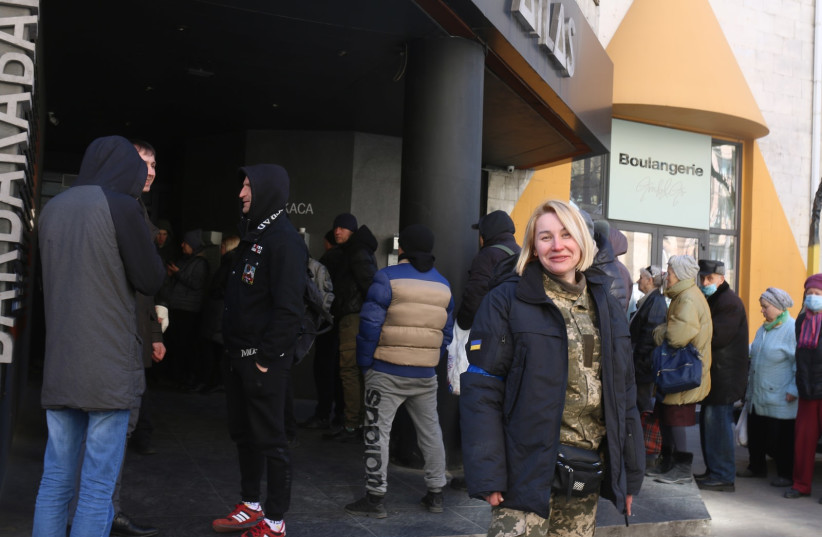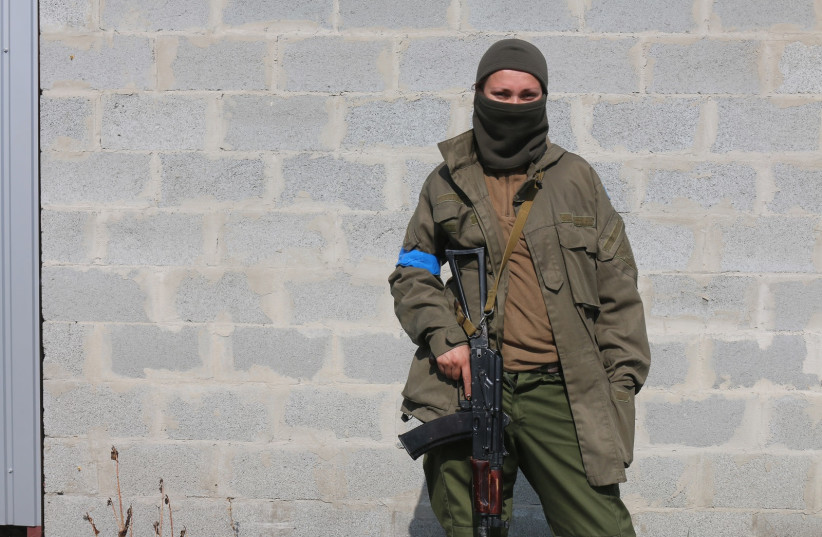[Kyiv, Ukraine] Russia’s decision to invade Ukraine has spurred on a feminist revival, with many women seeing it not only as a fight for Ukrainian independence but also as a fight against the traditionally conservative and Soviet past.
For more stories from The Media Line go to themedialine.org
“There is no difference in training and fighting between us women and men,” Victoria, a 32-year-old volunteer for the Ukrainians’ defense of the capital city Kyiv, tells The Media Line. “It is absolute equality on the front lines.”
Victoria, who was a housekeeper before the war, is now trained in small arms weapons and is being deployed to one of the many front lines outside the city.
“I have been trained to operate and use a machine gun,” she explains, adding, “and I am being deployed on the front lines outside the capital. I cannot say where though – it's not allowed – but it is near the Russians.”
This is reiterated by Alles, a former archaeologist and also a Kyiv resident, at a checkpoint nearby.

“There is no difference in the training between men and women,” Alles tells The Media Line. “The only difference is maybe the women are more likely to become [and work] as medics.”
The 37-year-old adds, “The war has meant that now, we all live, fight, and die together.”
Figures on the number of women in the Ukrainian military are difficult to come across, but they make up a significant proportion of the army.
“I think 30% of the army is women, but there are no official statistics,” Marianna, Alles’s former work colleague, speculates.
This figure, which seems high, may represent the fact that there are many women who are not armed but working to support the military effort.
“There are a lot of us, but some choose not to be soldiers, some choose to support the Ukrainian military in other ways, like through volunteering or as medics,” the 37-year-old tells The Media Line.
According to Alexander, a local resident who works as a fixer and has arranged interviews with women soldiers in the past, the number of female troops in Kyiv is limited.
“I drive all around the city; there aren’t many women at the checkpoints, less than 5% I would guess, maybe only 3%,” the 49-year-old Alexander tells The Media Line.
“There may be more, but the majority of those [women] who are fighting on the front lines have [or had] military backgrounds and are outside the city or in the east,” he adds.
In most militaries, women tend to provide support to those in fighting positions and are often directly segregated, at least to some degree, from their male colleagues.
“Maybe before the war that was the case,” Victoria explains, “there was a separation of men and women, but now we all live and fight and even sleep [in the same barracks] together – there is absolutely no difference.”
Ukraine – particularly in the conservative [and former Soviet] east of the country, around Donbas and Luhansk – has very traditional views of the role of women. However, as the country has moved progressively more toward Western liberal attitudes, the role of women has changed.
The 2014 revolution in Maidan square that overthrew the pro-Russian government of then-President Viktor Yanukovych represented the start of Ukraine’s shift toward the European Union and the West.
“I was a paramedic at that time,” Svetlana tells The Media Line, “and helped those who were injured back in 2014 in Maidan square, it was a very important moment in Ukrainian history for both men and women.”
The 50-year-old, who now works in the central coordination hospital in Kyiv allocating and deploying medical teams to the front lines, also sees little difference between the two genders now.
“I think all the women I know who have decided to stay to protect our homeland think the same. Men and women, we are all equal and we are all here to do the same job, protect Ukraine against the Russian aggression.”
Following the invasion on February 24, President Volodymyr Zelenskyy issued a decree that conscripted all men aged 18 to 60 for service of up to one year to deal with the Russian threat. Women of a similar age were exempt, something, which the women we interviewed choose to ignore.

“We could have left, but we do not want to stay outside [Ukraine],” Alles explains, “so despite being allowed to leave we did not want to [and] we came to our commander, and he agreed to take us. … We are so glad to have the opportunity to defend our country.”
This changed role for women, fighting and dying side by side with men, seems to have changed many people’s attitudes toward the role of women in Ukrainian society.
“Before the war, there were traditional Soviet values, but after the Russian invasion all that has changed, men and women, we are all the same we are all equal” she explains.
This is something reiterated by her friend, Marianna: “Yes, because of this war, all the differences between man and women have been eliminated, everyone is equal. In this war, man, woman, we are all equally willing to die in our fight against these [Russian] aggressors.”
